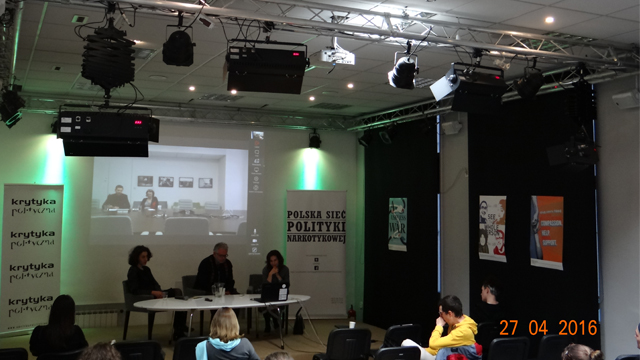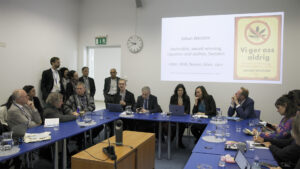Why can you get a death sentence in Singapore for a joint, while in Colorado you can buy it at the shop? Read the report of our Polish guest authors about a discussion on UN drug policies in Warsaw!
As part of the post-UNGASS global debate, a meeting was organised in Poland on the topic, UNGASS 2016 – INTERNATIONAL LAW AND REPRESSIVE DRUG POLICY. The main question was, “Why can you get a death sentence in Singapore for a blunt, but in Colorado you can buy it at the shop?” with many thoughts on the current state of global drug policy and the effects of the War on Drugs. The main focus of discussion was the outcome document on global drug strategy, adopted by the UN during UNGASS.
|
The panellists were:
Live from New York City:
Live from Brussels:
Moderator – Magdalena Dąbkowska, Global Drug Policy Program, Open Society Foundation |
The debate was led by the video report, “UNGASS on Drugs: Reform Aborted” (production: Drugreporter, Rights Reporter Foundation). The screening depicted civil society involvement in advocacy efforts to end the War on Drugs, stories of people who have lost their loved ones to drugs as a result of the lack of regulation of these substances, and effective harm reduction measures. It included amazing footage of what happened in New York City a couple of weeks ago, with expert commentary – watch it below!
As Artur Domosławski pointed out, the USA has spent over 1 trillion dollars fighting the War on Drugs over the last 40 years! Poland spends over 100 million PLN (over 25 million USD) each year to persecute people for simple possession of drugs – usually small amounts of cannabis for personal use. In Mexico, the war with drug cartels, which began in 2008, has so far claimed at least 90,000 lives. In Colombia, 3.4 million people have had to leave their homes over the past 10 years, because of a drug war which includes huge scale military operations and aerial fumigation of coca crops. The War on Drugs has been fought for over 50 years, with all of war's inherent lawlessness and brutality. We are witnessing a global conflict, fought not against drugs, but against people.
In mid-April, representatives from all over the world gathered at the United Nations General Assembly Special Session on the World Drug Problem, the first such event in the last 18 years, with the potential to change the lives of millions of people. So did it? The outcome document adopted at UNGASS does not include calls to change the global drug strategy: it does not suggest the abolition of the death penalty for drug offences, or embody support for harm reduction. It does, however, mention respect for human rights. Once again, the “zero tolerance” slogan conveys the idea of a total war against drugs, complete with strategies for repression and intimidation. The document was adopted by consensus between the member states in the first minutes of the summit, before any of the debate that we had expected to influence it over the following days. This caused protests from the civil society representatives, who felt that essential contributions from scientists and some country delegations had been stifled.
Reflecting on the Polish position in relation to the UNGASS outcome document, which does not criticise the use of death penalty for drug offences, Marcin Chałupka made a good point, that the Polish position is self-contradictory – because in international terms, we have made a public call for stronger protection of human rights at the UN, while at a national level, we pursue a very punitive drug policy. Kasia Malinowska-Sempruch expressed a similar opinion: we have created a harsh system, which seeks to solve the drug problem through criminal law measures, which logically leads to the death penalty as a last resort. The foundations of this system have to be changed, and the necessary paradigm shift is not possible without public support. But what if the public is uninformed, or knows only what it hears and sees in the media? In Poland, and elsewhere, we are served up a narrative which effectively creates an image of public enemy number one: drugs, drug abuse, drug users.
Polish drug law is one of the least humanitarian and rational in Europe, while being one of the harshest. The current Drug Abuse Prevention Act (DAPA) makes possession of any amount of any drug a criminal offence, punishable by up to three years' imprisonment. In 2015, 30,000 people were prosecuted under this law, including 27,000 for possession of small amounts of cannabis for personal use (among them, 2,000 minors). The same thing applies to problematic drug users: as Draginja Nadazdin said, the last thing we should be offering them is imprisonment and stigmatisation.
Speakers cited multiple examples of human rights abuses around the world, stemming from the War on Drugs. In Saudi Arabia, 16-year-old girls, sentenced to death for drug offences, have been waiting in prison for two years so they can be legally executed. In Mexico, organised crime has brought the country to the brink of collapse. All the executions conducted in Indonesia in 2015 were for drug crimes, with 12 out of 15 relating to foreigners, who had limited access to a lawyer or translator, and were tortured to obtain confessions. The MEP, Michał Boni, referred to the need to provide alternative sources of income for people making a living from drug production and small-scale trafficking. Opium farmers in Afghanistan are the most vulnerable link in the drug supply chain there, and the main target for government operations which include military raids and destruction of crops. Left without any means of subsistence, farmers sell their daughters and sisters. Human trafficking becomes rampant. These are all direct results of the War on Drugs and the international drug control system, and the lack of reference to these issues in the UNGASS outcome document creates an opportunity for further abuse, making the most vulnerable communities victims of the system.
It is, however, extremely important that the outcome document mentions pain treatment. Access to essential medicines had previously not been considered especially significant, and restrictive laws in various countries made it difficult, if not impossible. 100,000 Polish people suffer each year with pain caused by cancer: even though opioid-based medications are affordable, their use is much lower than it should be. They are considered to be narcotics, not pharmaceuticals. Poland is the only EU country that requires doctors to use a special prescription in order to obtain opioid painkillers for patients. Because of such strict regulations, only 4% of doctors in the Masovia region prescribe such medication, as Magda Dąbkowska mentioned. Reports from the World Health Organisation indicate that 80% of patients around the world are not properly treated for their pain, because of a lack of appropriate access to painkillers.
Despite mentioning human rights and pain treatment, the UNGASS document shows that civil society representatives still have a long way to go. Without a discourse based on the harm reduction philosophy, the introduction of an effective global drug strategy is impossible.
Agnieszka Sieniawska and Paulina Celińska-Chomiuk
Polish Drug Policy Network




